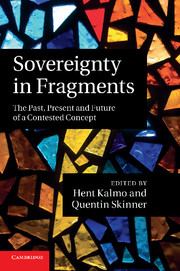Book contents
- Frontmatter
- Contents
- Notes on contributors
- Acknowledgements
- Introduction: a concept in fragments
- 1 The sovereign state: a genealogy
- 2 The apparition of sovereignty
- 3 The Westphalian myth and the idea of external sovereignty
- 4 Double binds: sovereignty and the just war tradition
- 5 The durability of organized hypocrisy
- 6 A matter of fact? The many faces of sovereignty
- 7 The survival of sovereignty
- 8 Sovereignty and after
- 9 Prolegomena to the post-sovereign Rechtsstaat
- 10 Sovereignty beyond the state
- 11 Sovereignty between government, exception and governance
- 12 Conclusion: vocabularies of sovereignty – powers of a paradox
- Bibliography
- Index
9 - Prolegomena to the post-sovereign Rechtsstaat
Published online by Cambridge University Press: 04 February 2011
- Frontmatter
- Contents
- Notes on contributors
- Acknowledgements
- Introduction: a concept in fragments
- 1 The sovereign state: a genealogy
- 2 The apparition of sovereignty
- 3 The Westphalian myth and the idea of external sovereignty
- 4 Double binds: sovereignty and the just war tradition
- 5 The durability of organized hypocrisy
- 6 A matter of fact? The many faces of sovereignty
- 7 The survival of sovereignty
- 8 Sovereignty and after
- 9 Prolegomena to the post-sovereign Rechtsstaat
- 10 Sovereignty beyond the state
- 11 Sovereignty between government, exception and governance
- 12 Conclusion: vocabularies of sovereignty – powers of a paradox
- Bibliography
- Index
Summary
A huge scholarly output has problematized the topic of the post-sovereignty condition in general and the emergence of the European Union as a ‘polycentric, pluri-systemic, multi-state legal order’ in particular. If sovereignty is the supreme legal authority of the nation to give and enforce the law within a certain territory without exterior interference, we are witnessing a transformative decline of this authority on a hitherto unprecedented scale with the bulk of member states' statutes now originating in European harmonization directives or framework decisions. This transformation has especially raised concern with respect to the democratic process and the self-determination of the member states.
However, this chapter does not concern itself with these aspects of the transformation(s) but focuses instead on the possible consequences for the Rechtsstaat, the continental conceptualization of the rule of law. The choice of subject matter follows from the Rechtsstaat's undeniable sociological importance and normative potential in various European legal traditions. On the one hand, there is the concept's centrality as the mutual articulation of two fundamental principles of political philosophy, the state and the law, whereby the law builds the very structure of the state instead of just being an external limitation to it. On the other hand, the Rechtsstaat is widely considered to be a safeguard against state enchroachment on the civil and political rights of the individual.
- Type
- Chapter
- Information
- Sovereignty in FragmentsThe Past, Present and Future of a Contested Concept, pp. 169 - 185Publisher: Cambridge University PressPrint publication year: 2010
- 1
- Cited by



